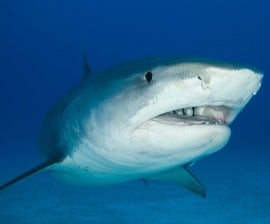-

Shark fin soup is cruel and wasteful. Chris Dascher/istock
MONTREAL— Humane Society International/Canada is joining the family of the late Rob Stewart, writer and director of the renowned documentary Sharkwater, in welcoming the introduction of Green Party MLA Sonia Furstenau’s landmark bill that would end the possession, sale and distribution of shark fins in British Columbia.
Sharks are often hunted for their fins, which are used to make shark fin soup. The practice is cruel because once the fin is sliced off, the shark is left to a slow, agonizing death on the ocean floor. In 2016 alone, Canada imported over 140,000 kg of shark fins, an increase of over 34,000 kg per year since 2012. The University of Guelph conducted a study on DNA tests on samples of shark fins sold in the Vancouver area, and discovered that 76 percent of the fins were from species listed as vulnerable by the International Union for the Conservation of Nature.
Give now to help protect sharks and other animals.
“Cutting the fins off sharks and tossing them into the ocean to die is an exceptionally cruel practice that puts entire ocean ecosystems at risk,” said Rebecca Aldworth, executive director of HSI/Canada. “This bill is an important step towards ending Canadian trade in products of shark finning and we ask the BC government to pass it as a matter of urgency. We also call on the Canadian government to take action now to stop the import of shark fins into Canada.”
MLA Sonia Furstenau said, “Every year, in oceans around the world, tens of millions of sharks are condemned to a slow and painful death from the cruel and wasteful practice of shark finning. Many shark species are threatened and their populations are unable to rebound in the wake of unsustainable kill levels. The survival of sharks is vital to sustain healthy oceans, marine species, and our planet. This is why we are proud to put this bill forward.”
Sandy and Brian Stewart, parents of the late Rob Stewart, issued the following statement: “Ten years ago, Sharkwater was released globally and exposed the urgent need for governments to stop the trade in shark fins. Since that time, over a billion sharks have endured a horrific death as a result of this ecologically devastating practice. We are so pleased to support this bill, which would stop shark fin trade in BC, and make BC a provincial leader in marine protection. We also urge the Canadian government to act quickly to ban the import and sale of shark fins. The sharks—and the ocean ecosystems that depend on them—do not have another ten years to wait.”
Facts:
- HSI/Canada has campaigned to end the shark fin trade for more than 10 years. Globally, HSI has been at the forefront of a powerful movement to protect sharks and stop the trade of their fins through education and legislative efforts.
- In 2012, the Union of BC Municipalities passed a near-unanimous resolution calling upon the provincial government to ban the sale, trade and distribution of shark fins and on the federal government to ban the import of shark fins.
- In April 2017, Canadian Senator Michael MacDonald introduced Bill S-238, the Ban on Shark Fin Importation Act, which would prohibit the import of products of shark finning.
- Seventeen Canadian municipalities have banned the sale of shark fin products, including Abbotsford, Brantford, Coquitlam, Duncan, City of Langley, Township of Langley, London, Maple Ridge, Mississauga, Nanaimo, Newmarket, New Westminster, North Vancouver, Oakville, Pickering, Pitt Meadows, Port Moody and White Rock.
- In 2013, the Chinese government banned shark fins from all official state functions.
- Sharks grow slowly, mature late, and have relatively low rates of reproduction, making shark populations highly vulnerable to the impacts of overfishing. As apex predators, shark populations impact all other marine species and entire ocean ecosystems depend on their survival.
- Neither the Convention on International Trade in Endangered Species of Wild Flora and Fauna (CITES) or the Species at Risk Act provide protection for the majority of imperiled shark species, as together they only protect eight species of sharks. This means that out of 141 vulnerable shark species, only eight are protected by Canadian federal laws.
Media Contact: Christopher Paré — office: 514 395-2914 x 206 / cell: 438 402-0643, email: cpare@hsi.org
